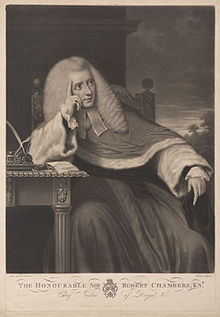Robert Chambers (English judge)
| Robert Chambers | |
|---|---|
 |
|
| Puisne judge of the Supreme Court of Judicature at Fort William in Bengal | |
|
In office 22 October 1774 – 3 December 1783 |
|
| Sole Justice of the Presidency Court at Chinsurah | |
|
In office 9 July 1781 – 15 November 1782 |
|
| Acting Chief Justice of the Supreme Court of Judicature at Fort William in Bengal | |
|
In office 3 December 1783 – 25 January 1791 |
|
| Chief Justice of the Supreme Court of Judicature at Fort William in Bengal | |
|
In office 25 January 1791 – 25 July 1798 |
Sir Robert Chambers (14 January 1737–9 May 1803), was a jurist, Vinerian Professor of English Law, and Chief Justice of the Supreme Court of Judicature at Fort William in Bengal.
Born in January 1737 in Newcastle upon Tyne, Chambers was the son of Robert Chambers, an attorney. He was educated at the Royal Grammar School in Newcastle and awarded an exhibition at Lincoln College, Oxford, in May 1754. Chambers was admitted to the Middle Temple in the same year, and was called to the bar in 1761. In that year, he was also appointed to a fellowship at University College, Oxford. On 7 May 1766 he was appointed Vinerian Professor of English Law at the University of Oxford, in succession to William Blackstone. He was also appointed Principal of New Inn Hall in 1766, a post which he held until his death, despite continued absence from it.
A contemporary and friend of Samuel Johnson from at least 1754 and up to Johnson's death in 1784, Chambers was provided references by Johnson in his pursuit of the Vinerian scholarship. Whether Johnson also assisted Chambers in composing his lectures, as was sometimes rumoured, is not known.
By 1773, the East India Regulating Act 1773 had been passed, establishing a supreme council (consisting of a governor-general, the first of whom was Warren Hastings, and four councillors) and judicature (consisting of a chief justice and three puisne judges) of Bengal. Chambers was appointed second judge under Sir Elijah Impey as chief justice, with a promise from the Lord Chancellor that if the Chief Justice's post became vacant, it would be offered to him. The judges departed for Calcutta in May 1774, although Chambers persuaded the Oxford authorities to allow him to retain his professorship for a further three years, in case he did not adapt to the Indian climate. His successor was therefore not appointed until 1777, when he was knighted (on 7 June).
...
Wikipedia
